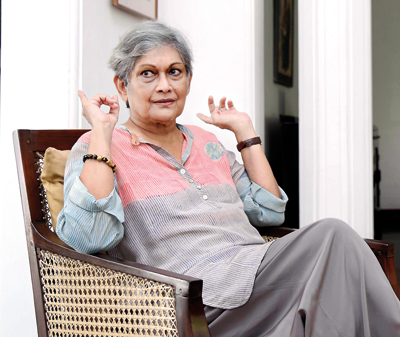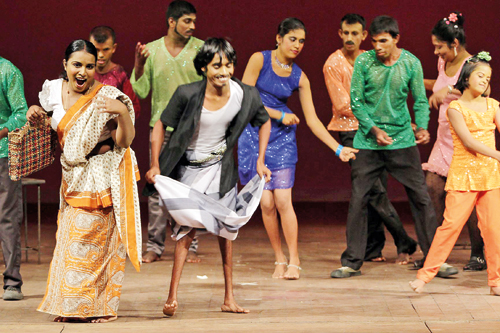She gave them theatre, they gave her life lessons

Taking wing: An image from the book
A child pirouettes onto the stage. As she, in love with the limelight, prances and dances, she is joined by others with smiles trusting and innocent, taking us to a realm where there are no wolves in the shadows. Where in fact, says Sunethra Bandaranaike, “none of the negative qualities of us non-disabled humans exist.”
It is time to toast the Sunera Foundation, which has come of age growing from performance to performance till it stands confident today at 20- with great gull’s wings hued like those of a bird of paradise.
The Sunera Foundation has touched more than 5,000 lives up to now, changing their potentially moribund, tragic trajectory and bringing laughter, song and dance to the erstwhile silence of their world.
Marking two decades of empowering disabled children and youth through the performing arts, their journey is told in a sumptuous coffee table book called ‘Wings: The Sunera Story’, written by Smriti Daniel with photography by Suda Shanmugaraja and Malaka Premasiri.
For Sunethra Bandaranaike, the founder and chairperson of Sunera, daughter of two Prime Ministers of this country- SWRD Bandaranaike and Sirimavo Bandaranaike, it has been a deeply personal mission.
In her house down Buller’s Lane which has the air of a colonial walawwa with a frangipani-smelling garden and white airy halls, she shares the story of a chance encounter that would lead her on a path away from the political.
The Sunera story begins on a rainy afternoon some 22 years back when Sunethra was persuaded to visit a concert put together by her friend, theatre director and choreographer Wolfgang Stange. She had promised to drop in for 15 minutes, but instead stayed throughout, ‘utterly mesmerized’, and ended up buying dinner for the entire cast and crew.
What Stange did was to pick up disabled children from underprivileged Colombo and make them dance and act to music. Sunethra was drawn in by the sheer magic their time on stage worked on these children. Stange, confident of Sunethra’s mettle, encouraged her to take the lead.
For their first performance they selected 10 disabled soldiers from the Ranaviru Sevana, young people from the East wracked by the war, along with some of Stange’s regulars. They had to be all lodged, 40 strong, together for six weeks with Stange and dance instructors so that they would come up with the production, script and all.

Sunethra Bandaranaike: Pic by Akila Jayawardana
They were lucky to get, for a nominal sum, the Teacher Training Institute at Meepe which has ample hostelry for male and female participants with kitchens, dining rooms and gardens as well as halls. Here with dance instructors Rohana Deva and Ramani Damayanthi they moulded a plot about the war, “what it does to human beings – how it tears them apart- how it destroys friendship”.
This was the prototype of the kind of real life stories Sunera would always do “because we don’t believe in fairy stories” says Sunethra. The cast rehearsed from morning till night, and they were delighted with the process.
One of Sunethra’s greatest fears was allayed when she heard that the disabled soldiers got on strikingly well with the Tamil children- the girls even pushing their wheelchairs. Says Sunethra, “I thought ‘my God if nothing else comes of it at least a friendship is being built up.”
Their first performance, at the Bishop’s College auditorium called Butterflies will Always Fly, was a roaring success- but it was to be the whetting stone for what remains Sunera’s chef d’oeuvre.
This was Flowers Will Always Bloom, probably still remembered in London. Made possible with so many well-wishers from the High Commissioner to Sri Lankan restaurant owners in the UK, it was so moving that Sunethra’s old friends from Oxford were crying at the end.
The English-speaking audiences said they could follow the story with no trouble, and the Commonwealth Foundation, which funded part of the show, took it to Brisbane where they were the star performers at the Heads of the Commonwealth conference. They were to also perform in India.
Swinging Times, Sunera’s third production, was about the vile practice of making money out of war, “guns, cannons, planes”, and done with beautiful papier mâché masks people could not know the actors were disabled.
What Sunera has achieved over the past 20 years is engraved in the hearts of the disabled youth and their families. The change in them has been miraculous.

Shining on stage: Performers enjoying themselves at an Anamaduwa workshop production
“They can now walk on the roads with their parents, they will say ‘good morning’ to someone who goes past, go to a grocery store and ask for something, enjoy playing with their siblings- they have become totally different. They are almost like non-disabled children.”
Sunera would never have been a success without the trainers, nearly 40 of them who are passionate about what they do.
It is their ability to notice what a certain child likes best, dancing, drama or drawing, and guide them further that enables them to excel.
Today, Sunera has 38 workshops spread all over the country, and working with Pradeshiya Sabha or District Secretariats they ensure that all guardians of disabled youths get to hear of the service. The workshops happen in groups of 20 to 40.
“The philosophy has been to engage, engage and bring them together,” says Sunethra. “Make them friends- each one sharing their strength with others. That is what we are doing so they can on their own (with some training by us) come out of their shell, recognize that they have abilities and that these abilities are appreciated by people around them.”
A workshop happens once a week for three hours. They start with relaxed music and build up into livelier beats, and end with a yoga session to relax down.
Each workshop does a stage drama, with a script written by trainers, which is then read by an expert.
Each performance is 20 minutes and creates a flurry backstage, as trainers and parents add last minute touches and try to keep the lid on a tense situation so the excited performers can safely emerge into the spotlight .
It’s the end of a show that always gives Sunethra a lump in the throat. “They stand up as if to say ‘look at me; I am like you. You have rights- so have I’. They don’t say that but you can see that. It is unbelievable to see their faces and the expressions.”
As Alison Skilbeck says in the Foreword to Wings, Sunethra’s “heart beats to the rhythm of Sunera.” It is her child.
As she looks back on a journey of liberation, Sunethra confesses her own life was “hugely enhanced”.
“It’s amazing – the love they give, unstintingly. We are selfish, we are greedy but believe me they don’t have any of it.”
“We learn from them. Are we teaching them or are they teaching us? At some point I ask that question…”
(Priced at Rs. 4500, Wings is available at the Sunera Foundation office and leading bookstores)



